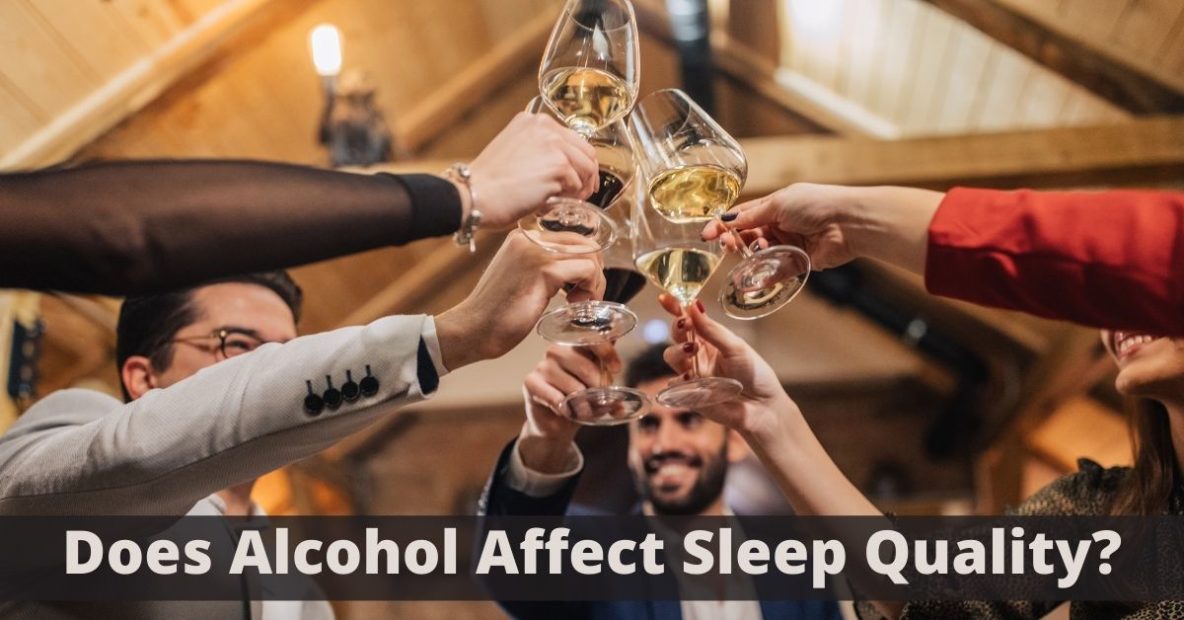Does Alcohol Affect Sleep Quality?

- A Promising Paradigm Shift: New Research Challenges the CPAP-First Approach to OSA Treatment - September 5, 2023
- Understanding Sleep Meditation Techniques - July 30, 2021
- How Online Learning Has Affected Sleep for Students - July 13, 2021
Do you drink a beer before bed because you think it helps you have a good sleep? Many people think alcohol can be a great sleep aid, but the research doesn’t back them up. In fact, studies show that alcohol has a negative effect on sleep quality. The more you drink, the worse you’ll sleep!
Why Do We Think Alcohol Helps Us Sleep?
If you drink a glass of wine before bed, you notice you fall asleep easier. How is it that alcohol affects sleep quality? Alcohol can help you fall asleep quickly. Drinking in the evening will help you nod off the moment your head hits the pillow.
The amount you drink also affects your sleep quality. If you just have one or two drinks, you may not notice any disruptions in your sleep, so you’ll be more likely to think alcohol is helping you sleep.
How Does Alcohol Affect Sleep Quality?
However, if you have several drinks in the evening, you’ll have a worse sleep. This is because alcohol is a depressant that causes the brain to slow down. Drinking alcohol in the evening will reduce the amount of time you spend in rapid eye movement (REM) sleep. The more you drink, the less amount of REM sleep you’ll get during the night. REM sleep is a restorative stage of sleep. During REM sleep you also dream and consolidate memories. When you don’t spend enough time in REM sleep in the night, you will experience daytime drowsiness, and have trouble concentrating.
Drinking alcohol will suppress REM sleep. At the beginning of the night you may spend more time in deep sleep. But this will cause an imbalance in the sleep cycles in the second half of the night. You’re less likely to spend enough time in REM sleep and you’re more likely to sleep poorly.
Alcohol and Sleep Apnea
Alcohol can also cause other disruptions in sleep. For example, drinking in the evening can increase your likelihood of sleep talking, moving in your sleep, or even sleepwalking. Drinking at night can also cause breathing difficulties such as sleep apnea.
Sleep apnea is a disorder where the muscles in your throat relax during sleep, blocking your airways and momentarily stopping your breathing. Your brain realizes that oxygen levels are dropping, and briefly wakes you up to tighten the muscles and restart the breath. This can happen up to 30 times in one hour! People don’t always realize this is happening, and in the morning, you might not remember waking up during the night.
Since alcohol is a depressant, it can cause sleep apnea. It can cause your muscles to be overly relaxed during sleep, and this affects the quality of your sleep.
Alcohol and Insomnia
Are you in a cycle of drinking every night, feeling tired during the day, and drinking the next night to help you fall asleep? Alcohol and insomnia are linked. When you drink in the evening, you don’t get enough REM sleep during the night. You wake up feeling tired and groggy. You reach for a coffee or another stimulant to give you energy for the day. This can lead to insomnia, or having a hard time falling asleep the next night.
The daytime caffeine makes it hard for you to sleep, so you drink alcohol in the evening to help you fall asleep, and once again have a poor night’s sleep. This vicious cycle of insomnia, caffeine, and alcohol can make it even harder to get the sleep your body needs.
Getting Better Sleep
If you want to enjoy a great night’s sleep, try cutting back on your alcohol consumption. Most people can have one or two drinks and sleep just fine. However, alcohol affects everyone differently, and for some people even one drink can negatively affect sleep quality.
Another way to get a better sleep is to drink less coffee in the afternoon so that caffeine won’t be keeping you up in the night. Other sleep tips to get a good night’s sleep include keeping a consistent sleep schedule, turning down the heat in your room, and avoiding eating right before bed. For more tips on how to get better sleep, visit us at Sound Sleep Medical.
